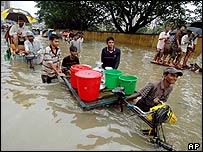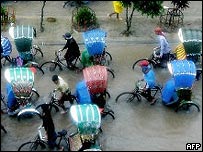Worst Floods in Decades hit Dhaka
2004 09 14
By BBC News

Many roads are waist deep in water |
Bangladeshi authorities have closed all government offices in the capital, Dhaka, as the worst flooding in decades hit the city.
Nearly all main roads in the city are under water. Officials say such severe flooding is "unprecedented".
An emergency meeting was held by the government, and the navy has been called on to help drain the city.
The premier has called for immediate measures to restore utilities and telephone services in worst hit areas.
Most vehicles are off the roads, train services have stopped running and food markets and businesses are shut.
In July, the rest of the nation experienced its worst floods in six years which left 600 people dead.
Open sewage
Meteorological officials believe recent rainfall is the worst for many years, overshadowing July's floods in which most of Dhaka's roads were knee deep in water.
The BBC's Waliur Rahman in Dhaka says there are concerns about sewage contaminating the city's clean water supplies and the effect of flooding on poorer people.
Our correspondent says that people in low lying areas are now buying emergency supplies and that many face grave conditions.
Businesses and markets were shut on Tuesday, increasing a floods bill that is already estimated to have cost hundreds of millions of dollars.
The Dhaka Stock Exchange has been suspended for a second day.
Flood waters can be seen outside centres of government, including the office of the prime minister, parliament and the secretariat.
Navy help
Prime Minister Khaleda Zia urged the authorities to take immediate steps to remove flood water from the most severely hit parts of the city.

The new floods have already cost hundreds of millions of dollars |
After an emergency meeting chaired by the Local Government Minister Abdul Mannan Bhuiyan, officials summoned the navy to help.
Mr Bhuiyan told reporters that navy personnel would be engaged in removing water from streets and other localities.
He said emergency measures were now in place and it was not necessary for the government to declare a national crisis.
In some areas, rainwater has entered ground floors and has submerged shops.
The deputy director of the Dhaka Meteorological Department, Arjumand Habib, told the AFP news agency that 341mm of rain had fallen in Dhaka on Monday, the highest recorded level in 50 years.
Parts of Dhaka's drainage system have collapsed after heavy rainfall left large areas of the city waterlogged.
At least seven people have been killed in incidents connected with the floods, including some who were electrocuted.
An official of the Dhaka Water and Sewerage Authority said that almost all the city was under water and its drainage system was unable to pump out such a huge amount in so short a period of time.
The worst affected part of the city - home to more than 10m people - is the business district of Motijheel, where all roads are waist deep in water.
Dhaka mayor Sadek Hossain Khoka said the flood waters would take at least 24 hours to recede. Weather forecasters say the rain will continue until Wednesday.
Three people were killed in the city when they came into contact with live electricity wires submerged in the water and four died in central Shariatpur district when their boat capsized in a river in a storm.
Power in many parts of the city has now been suspended to prevent further accidents.
More than 100,000 people were affected by water-borne diseases in the aftermath of July's floods.
The government estimated they caused around $7bn of damage.
Earth Changes TV
Article From:
http://www.earthchangestv.com/secure/2004/article_3887.php

|
